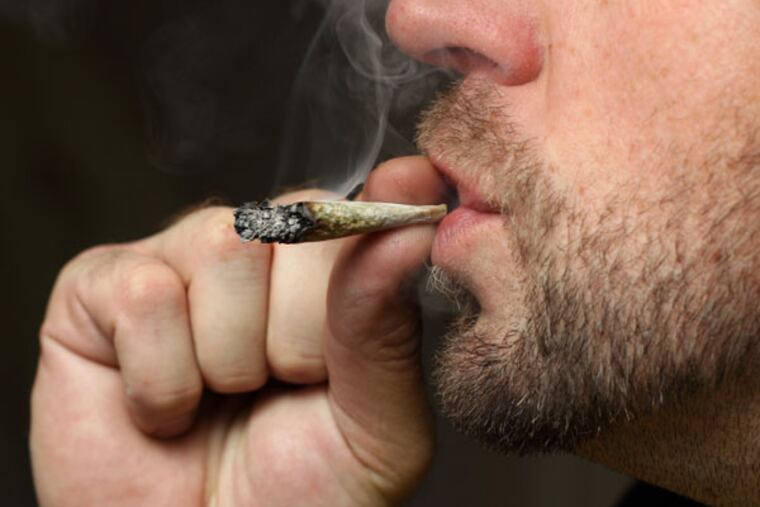Philly420: Dear Pope Francis, here's why you'd like Philly's pot decriminalization
When Pope Francis arrives in Philadelphia next month, he’ll be visiting the largest American city to have locally decriminalized marijuana. The millions of Catholics gathering for the World Meeting of Families in September are also covered by the policy.

When Pope Francis arrives in Philadelphia next month, he'll be visiting the largest American city to have locally decriminalized marijuana. The millions of Catholics gathering for the World Meeting of Families in September are also covered by the policy.
Pilgrims within city limits who have less than 30 grams of marijuana are subject to civil citations of $25 for possession and $100 if they smoke in public.
But do not expect giant censers of weed to be swinging on church altars or in the streets any time soon. They will be sticking with the frankincense.
While the current pontiff is progressive on a number of issues, legalizing cannabis is not one of them.
In 2014, he released a statement during the International Drug Enforcement Conference in Rome on the subject with the pope saying that legalization is "not only highly questionable from a legislative standpoint, but [fails to produce] the desired effects."
The statement was on the heels of Colorado legalizing marijuana and Uruguay creating a policy of state-supplied cannabis. Although it was a broad discourse on legalizing all drugs and did not target weed, it included the topic.
Since then, more states have regulated marijuana for adults, and popular support for ending marijuana prohibition has increased significantly.
Pope Francis has been fiercely outspoken in his defense of the poor and those in prison. Perhaps he has not seen the arrest statistics for marijuana here in the United States showing that low-income minority residents bear the brunt of criminal cannabis enforcement.
Still, the current Holy Father waded into the tremendous problem of America's outrageously large prison population and harsh sentences as well. Last summer, Pope Francis replied to letters from 500 U.S. inmates serving life sentences since they were juveniles. He called for change, saying all prisoners should have the "light of justice and the possibility of reform and rehabilitation."
Opponents of legal marijuana often downplay the incarceration results of prohibition. But there are some striking cases of Americans serving life terms for a little bit of pot.
Earlier this month, Jeff Mizansky was granted parole after national media attention to the fact that he was serving a life prison term for marijuana. Mizansky was the only inmate in Missouri with such a sentence because of a three-strikes law there. He is due to get out of prison any day.
In Louisiana, there is an even more striking case detailed by The Daily Beast. In 2008, Vincent Winslow was homeless and agreed to sell $20 worth of marijuana to a man who turned out to be an undercover cop. He was only going to make $5 facilitating the deal. Then the cops swooped in. Selling any amount of marijuana is a felony in Louisiana. Because Winslow had a prior criminal record, he received a life sentence in prison without any possibility of parole.
When the ACLU started looking into harsh sentences in the Deep South state, Winslow's case caught their attention. They asked him why he tried to sell the weed and he said it was to "get something to eat."
Again, perhaps Pope Francis is not aware of the nuances and full impact of marijuana prohibition in the United States. Considering his strong progressivism, he should be.
Another interesting insight into the Vatican's view on marijuana comes from the current effort to legalize medical cannabis in the Philippines.
That country has a very high concentration of Catholics. Roughly 80 percent of Filipinos identify as Catholic.
To that end, the Catholic Bishops' Conference of the Philippines (CBCP) addressed the issue: "The highest teaching authority of the Church allows for the palliative and compassionate use of narcotics particularly in the case of the terminally ill."
Basically, the church there is already OK with using cannabis for those who are dying.
In 2010, I participated in a panel on medical marijuana at St. Joseph's University with state Rep. Mark Cohen, D-Philadelphia. Also on the panel was Sister Patricia Talone, who holds a doctorate in ethics and helps to oversee the Catholic church's hospice programs throughout the Mid-Atlantic United States. It was a surprise that night to hear the hardworking nun express her support for medical cannabis in the case of terminal patients. She even said that the "high" from THC was a good thing to help comfort and alleviate suffering.
Our city is running a successful change with decriminalization that has kept thousands of people out of jail. More than 80 percent of us think the Pennsylvania legislature should pass a medical cannabis bill.
Prohibition does not exclude any religion. The failed policy has contributed to racial inequality in criminal justice, large jail and prison populations, and decreased civil rights.
Pope Francis visited Bolivia last month. At his request he drank tea brewed with raw coca, the plant that is refined into cocaine. Although the stimulating botanical is technically illegal under the 1961 United Nations convention on narcotic drugs, farming coca is ubiquitous in Bolivia and other nations. South Americans traditionally chew the raw leaves to deal with the extreme altitude in their countries.
Philly locals are preparing for traffic and travel disruptions of nearly biblical proportions to host Pope Francis. He does not need to go native here by smoking a blunt at LOVE Park. But it would be nice if he took a moment to consider our marijuana policies.
Chris Goldstein is associate editor of Freedom Leaf magazine and co-chair of PhillyNorml. Contact him at chris@freedomisgreen.com.